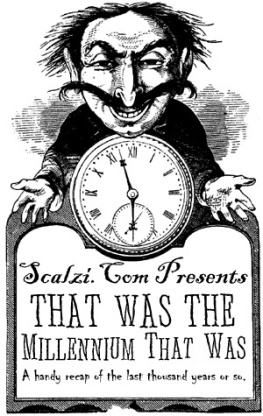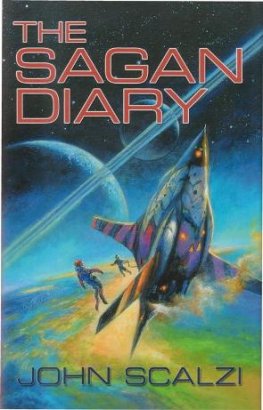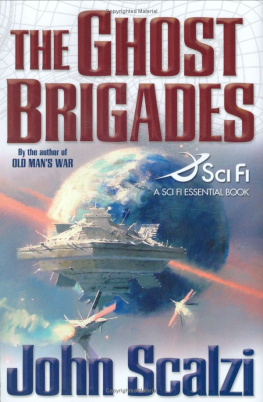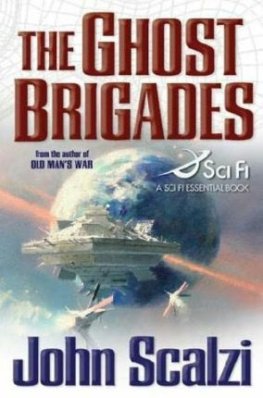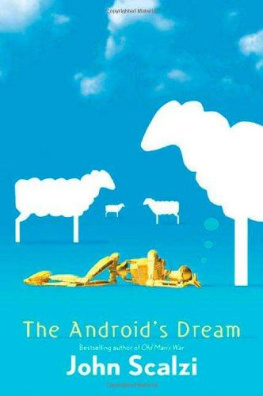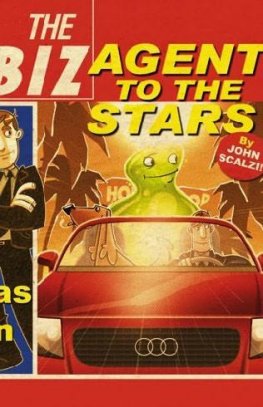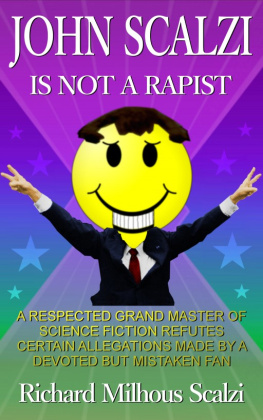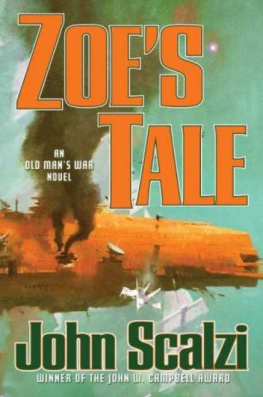John Scalzi - THAT WAS THE MILLENIUM THAT WAS
Here you can read online John Scalzi - THAT WAS THE MILLENIUM THAT WAS full text of the book (entire story) in english for free. Download pdf and epub, get meaning, cover and reviews about this ebook. year: 1999,2010, publisher: Scalzis Private Reserve, genre: Detective and thriller. Description of the work, (preface) as well as reviews are available. Best literature library LitArk.com created for fans of good reading and offers a wide selection of genres:
Romance novel
Science fiction
Adventure
Detective
Science
History
Home and family
Prose
Art
Politics
Computer
Non-fiction
Religion
Business
Children
Humor
Choose a favorite category and find really read worthwhile books. Enjoy immersion in the world of imagination, feel the emotions of the characters or learn something new for yourself, make an fascinating discovery.
- Book:THAT WAS THE MILLENIUM THAT WAS
- Author:
- Publisher:Scalzis Private Reserve
- Genre:
- Year:1999,2010
- Rating:4 / 5
- Favourites:Add to favourites
- Your mark:
- 80
- 1
- 2
- 3
- 4
- 5
THAT WAS THE MILLENIUM THAT WAS: summary, description and annotation
We offer to read an annotation, description, summary or preface (depends on what the author of the book "THAT WAS THE MILLENIUM THAT WAS" wrote himself). If you haven't found the necessary information about the book — write in the comments, we will try to find it.
THAT WAS THE MILLENIUM THAT WAS — read online for free the complete book (whole text) full work
Below is the text of the book, divided by pages. System saving the place of the last page read, allows you to conveniently read the book "THAT WAS THE MILLENIUM THAT WAS" online for free, without having to search again every time where you left off. Put a bookmark, and you can go to the page where you finished reading at any time.
Font size:
Interval:
Bookmark:
THAT WAS THE MILLENIUM THAT WAS
A handy recap of the last thousand years or so
BY JOHN SCALZI
1999 , 2010 by John Scalzi
This electronic edition of this collection was made available for free and can be shared on a non-commercial basis. Dont sell it! Dont buy it! Just enjoy it.
These essays originally published on Whatever, John Scalzis blog:
whatever.scalzi.com
INTRODUCTION (from 1999)
Oh, look. Another Millennium thing. Just what we need -- and I am well aware, thank you very much, that the Millennium doesn't truly occur until 2001. However, when there are 6 billion people on a planet, 5,999,900,000 of whom maintain that the year 2000 is The Millennium, the wee, small, logical voices of the remaining 100,000 count for exactly diddly. People like their major historical events to coincide with nice big round numbers, and there's little value arguing that point any more. 2000 it is.
Now, I originally wasn't planning to do anything regarding the millennium, because, really -- who isn't doing something on the millennium? However, the thought then occurred to me: When will be the next time I'll be able to wrap up an entire thousand years? (Yes, I know, 2001. Shut up.) Everybody's doing their millennial thing, but that doesn't mean it's automatically a bad thing. After all, everyone breathes oxygen, and that doesn't stop me from following the crowd.
And so, beginning November 1 and going through the remainder of 1999, I will present daily my selections for the Best of the Millennium. But not just any selections -- I'll b cataloguing the things people really care about (or should, in any event). Like: Best Lopsided War. Best Vision of Hell. Best Condiment. And how could we omit: Best Plague. No one else is going to get around to these categories, and, damn it, they deserve comment as well. So I'm gonna do it. Each day, for the rest of this millennium (or, more accurately, for the rest of the popular perception of this millennium).
INTRODUCTION (from 2010)
Not too much to add here; I was just playing with making electronic tests and thought this would be a fun little package to put together. Beyond that its an interesting historical document in its way its interesting to look back down through eleven years and see which things are still relevant after more than a decade, and which seem, well, quaint .
Technical notes: This little electronic book is only very lightly edited, and may have a few spelling/grammar/factual errors in it. I wrote each of these entries in just a few hours, using information I could find online (in 1999! Before Wikipedia!). While Im pretty sure most of what you read here is factually correct, there may be slipups here or there. Try to enjoy it anyway.
The entries are presented in the order they were written and posted, between November 1, 1999 and December 31, 1999.
Some of these entries have appear in edited form elsewhere, including in my essay collection Your Hate Mail Will Be Graded: A Decade of Whatever, 1998 2008. If you enjoy this, consider picking up that or other of my books. My mortgage thanks you.
This book is dedicated to my dog Kodi, who was with me in the last millennium and who just passed on. She was a good dog.
-- John Scalzi,
July 18, 2010
THAT WAS THE MILLENNIUM THAT WAS
Best Beverage of The Millennium.
Coffee. Hands down (and shaky). Discovered in 850 by an Arab goat herd, who watched his goats gobble some beans and then perform the world's first poetry slam, coffee finally hit the big time in the 16th and 17th centuries, when coffeehouses (almost none of them Starbucks!) were the rage in London, Paris and other European capitals. Nowadays it's the planet's favorite beverage; some 2 billion people suck down java every day.
Who is your average coffee drinker? Look in the mirror. Most serious coffee drinking begins in college, when the realization that your parents are now actually paying for your education inspires a student's very first all-night study session. This first true exposure to coffee generally ends in catastrophe as the student sucks down about six cups too many and spends several hours shaking like a Kobe earthquake survivor. But eventually the correct daily dosage is found, and a lifetime "friendship" with the brown stuff begins.
More than a beverage to keep people awake, coffee is a symbol of the American century, its jittery charms indelibly tied to an industrious people who rebuilt the world, from the days of Henry Ford to these days of Bill Gates, fueled by caffeine jolts that helped exaggerate America's already overly-developed "can-do" spirit. Take a look at the Empire State Building sometime, or a Dodge Viper, or the demo of the Quake Arena videogame. You can almost smell the bitter tang of that 7th cup that inspired that one guy to say, "Of course, you know what would be really cool..."
Coffee is tied to the US like tea is tied to the British, the former rulers of the world, and of course that fact is illustrated in who in the world drinks tea and who drinks coffee. Tea gets the nod in places like India, China (who, of course, got there first, but even so) and all those other places where the British empire oh so kindly shouldered its white man's burden, until the natives asked, if it was quite all right, old chap, if they could kindly have their own countries back. Coffee is everywhere else, except Russia, where the role of coffee is played by vodka.
You could even say that what you drink is what you are, at least when it comes to tea and coffee. Tea is refined; coffee, for all its success, is vulgar . Tea is old money going back to the 13th century or so; coffee earned its money selling tires, or collecting trash, or making television shows about babes fighting crime. Tea doesn't soil its hands; coffee is elbow-deep in motor oil and transmission fluid. Tea is in a cup; coffee is in a mug. Tea is aristocratic ; coffee is egalitarian (why do you think they call it "joe"?). At one point everyone who drank coffee aspired to be the sort of person to drink tea; nowadays, of course, these people realize that they don't actually like people who drink tea. People who drink tea don't do anything.
The bad news is that coffee is becoming tea. Tea has its Earl Greys and Orange Pekoes; coffee has lattes and half-caf double mochas. Used to be that these unholy brews were confined to the dark recesses of college town coffee shops , to be sucked down by scraggly-bearded graduate students who were reading yet another book on to bolster their thesis that Abelard and Heloise were precursors to the gender politics typified on the Jerry Springer show (or something), i.e., people who weren't doing anything. Now you can't throw a rock without hitting some overbred stock-option jockey with Starbucks coffee in one hand and a cellular phone in the other (try it. Throw hard).
Coffee qua coffee, the bitter engine of progress, is being tamed into a polite, froo-froo brew. Meanwhile, the coders and geeks who are constructing the framework of the 21st century are sucking down their Surges and Mountain Dews and that old carbonated friend, Cola-Cola (no serious coder drinks Pepsi). Caffeine will survive into the next millennium, but it's unclear if coffee will.
But you can do your part. Ditch the Starbucks 90% foam latte, go to the supermarket, and buy a can of, oh, Chock Full O' Nuts coffee. Go to the thrift store and buy a percolator. Put the coffee in and brew a pot. Then put some more coffee in and double brew it. Get a mug that's taller than it is wide, pour it in, and slam it down. As the bitter liquid sears your esophagus, swelling it to the size of a honeydew melon in your throat, you will undoubtedly be seized by the need to build the world's longest suspension bridge, or the highest clock tower, or the fastest personal computer with the most bitchin' graphic cards. Go do it. That's what coffee's all about.
Font size:
Interval:
Bookmark:
Similar books «THAT WAS THE MILLENIUM THAT WAS»
Look at similar books to THAT WAS THE MILLENIUM THAT WAS. We have selected literature similar in name and meaning in the hope of providing readers with more options to find new, interesting, not yet read works.
Discussion, reviews of the book THAT WAS THE MILLENIUM THAT WAS and just readers' own opinions. Leave your comments, write what you think about the work, its meaning or the main characters. Specify what exactly you liked and what you didn't like, and why you think so.

